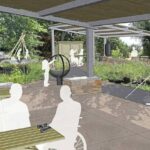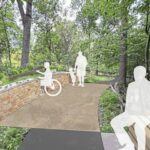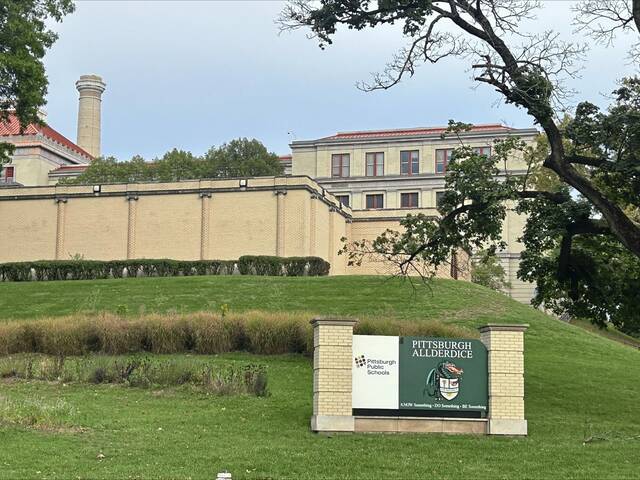Galivant through the forest, activate your desire for wonder, get in touch with nature and your transcendental side, run your hands through the leaves of the garden — this is exactly what the Pittsburgh Parks Conservancy wants visitors to do when the sensory classroom at Frick Environmental Center in Squirrel Hill opens.
The sensory classroom will provide a place for students of all ages and the public to engage with nature, access to educational programs, and specifically create a therapeutic space for those with learning exceptionalities.
“The spaces are designed to be accessible and inclusive, we took feedback to understand the challenges (that) learners with exceptionalities and persons with disabilities might encounter trying to engage in a nature space,” said Brandon Riley, capital projects manager at Pittsburgh Parks Conservancy.
Shade-structured spaces offer shade and protection from the sun and inclement weather, allowing visitors to feel comfortable outside.
“The sensory elements that we are designing encourage the community to explore and learn about nature or engage with nature through the five senses,” Riley said. “We have a raised forest floor exploration space, recognizing that not everyone can get down into the forest floor level. Someone using a wheelchair can have access and use their sense of touch by running their hands through leaves.”
Visitors can use their sense of sight by peering through to see the animals that live there, and sense of smell to experience the aroma of plants and soil.
“We want visitors to pick the soil apart and see what is there, but if there is a person who is blind or deaf they can also participate,” Riley said.
The classroom will be located in the wooded area of the Frick Environmental Center just below the Clayton Hill Meadow in Squirrel Hill. Construction is set to begin next year.
The planning began late last summer and an advisory committee was put together that included staff members from Pittsburgh Public Schools as well as accessibility advocates.
“We had focus groups that we worked with early on,” Riley said.
The project was also presented to three different occupational therapy classes at Duquesne University students who gave feedback about occupational therapeutic qualities, according to Riley.
The Edith L. Trees Foundation provided initial funding for the project, which will cost about $1.5 million once everything is finished. Additional donors also provided funding, and the sensory classroom at The Frick Environmental Center is currently part of the City of Pittsburgh’s capital budget, which will provide $200,000 to close the construction funding gap.
The sensory classroom will encompass about three acres, however, the area where the development will move the soil is much less.
“We are doing our best to limit the impact — we are not cutting down any significant trees, we are limiting our impact on vegetation. The intention is to preserve nature,” Riley said.
“What was really amazing is that they took us step by step and they showed us designs and options as they went,” said Tammi Morton, director of operations for Autism Connection of PA. “They took the feedback we gave and updated things according to what the community had to say. I cannot wait for people to see the raised gardens. We have a lot of people who can benefit from having that up higher. There is also a sort of pebble harp that plays music, and I can imagine many of us enjoying it because it is soft sounds.”
Morton said a lot of times projects built for people on the spectrum happen without asking them what works for them, so Autism Connection was thrilled that they asked for people in the Autism community to give input.
“Outdoor spaces are inherently sensory friendly most of the time, especially so many times in buildings we ask for natural light and low sounds. Just the nature of the project is something that we really embrace,” Morton said.
“Interacting with our natural world is a beautiful way to learn,” said Mallory Hudson, outreach coordinator at Community Living And Support Services. “I hope people will get to enjoy the space, but I also hope other communities or parks will see how doable and valuable it is and want to replicate it in their own way.”
Both Morton and Hudson, who served on the advisory committee, were pleased with the consideration for safety when designing the project.
Pittsburgh Parks Conservancy is in the fundraising phase of setting up a lending library of assistive and adaptive technologies — if a visitor were to come to the FEC to use the space, they could borrow the equipment for free, another facet to improve the user experience.
A sensory kit might have noise-canceling headphones, fidget spinners, a weighted blanket and other sensory elements that might help visitors who are hyper or hypo-sensitive.
They are also planning to provide adaptive binoculars and Wi-Fi-enabled binoculars, which can cast the image that the binoculars are looking at onto a phone or tablet. Someone who might not have control of their neck, hands or wrists would be able to participate by looking at a phone or a screen with a caregiver who is operating the binoculars. There will be assisted devices for hearing that will enable guests to pick up on particular sounds that may not be within a particular threshold, Riley said.
GPS audio tours are available for those who don’t have smartphones.
The process was about more than just building a space and having a multilayered approach to make sure that it is truly inclusive, Riley said.
Currently, on the sensory classroom website, visitors can provide input on other organizations that should be consulted for the project.
“There is wisdom in diverse counsel,” Morton said.











